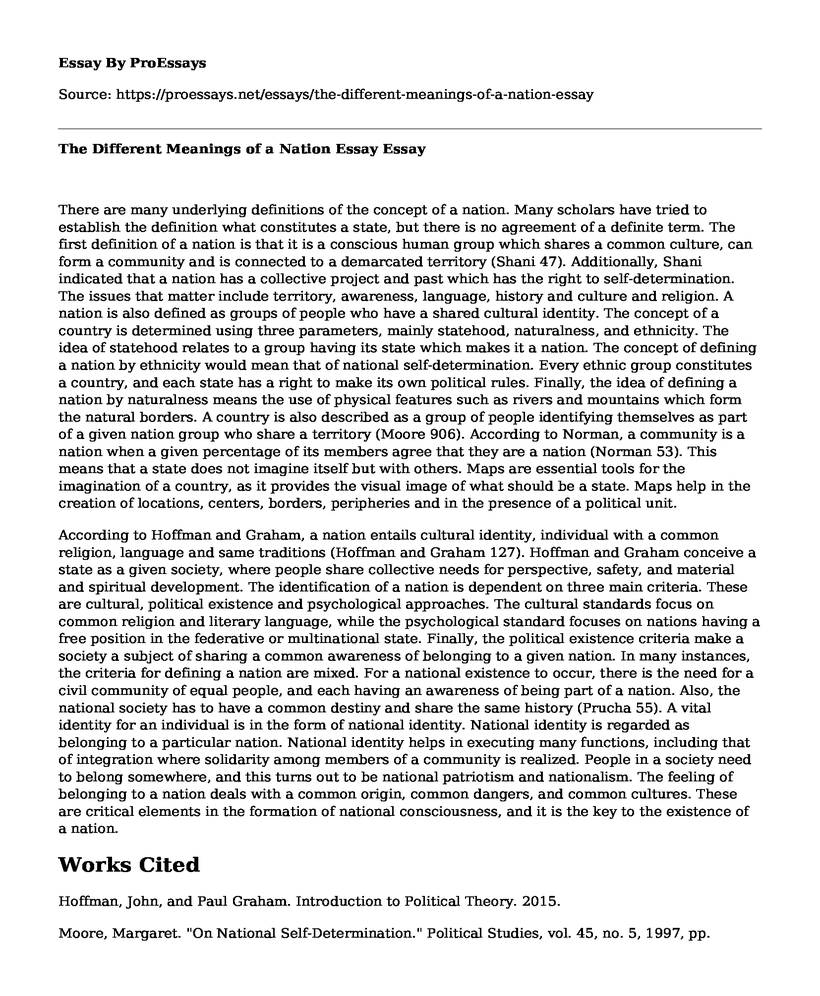There are many underlying definitions of the concept of a nation. Many scholars have tried to establish the definition what constitutes a state, but there is no agreement of a definite term. The first definition of a nation is that it is a conscious human group which shares a common culture, can form a community and is connected to a demarcated territory (Shani 47). Additionally, Shani indicated that a nation has a collective project and past which has the right to self-determination. The issues that matter include territory, awareness, language, history and culture and religion. A nation is also defined as groups of people who have a shared cultural identity. The concept of a country is determined using three parameters, mainly statehood, naturalness, and ethnicity. The idea of statehood relates to a group having its state which makes it a nation. The concept of defining a nation by ethnicity would mean that of national self-determination. Every ethnic group constitutes a country, and each state has a right to make its own political rules. Finally, the idea of defining a nation by naturalness means the use of physical features such as rivers and mountains which form the natural borders. A country is also described as a group of people identifying themselves as part of a given nation group who share a territory (Moore 906). According to Norman, a community is a nation when a given percentage of its members agree that they are a nation (Norman 53). This means that a state does not imagine itself but with others. Maps are essential tools for the imagination of a country, as it provides the visual image of what should be a state. Maps help in the creation of locations, centers, borders, peripheries and in the presence of a political unit.
According to Hoffman and Graham, a nation entails cultural identity, individual with a common religion, language and same traditions (Hoffman and Graham 127). Hoffman and Graham conceive a state as a given society, where people share collective needs for perspective, safety, and material and spiritual development. The identification of a nation is dependent on three main criteria. These are cultural, political existence and psychological approaches. The cultural standards focus on common religion and literary language, while the psychological standard focuses on nations having a free position in the federative or multinational state. Finally, the political existence criteria make a society a subject of sharing a common awareness of belonging to a given nation. In many instances, the criteria for defining a nation are mixed. For a national existence to occur, there is the need for a civil community of equal people, and each having an awareness of being part of a nation. Also, the national society has to have a common destiny and share the same history (Prucha 55). A vital identity for an individual is in the form of national identity. National identity is regarded as belonging to a particular nation. National identity helps in executing many functions, including that of integration where solidarity among members of a community is realized. People in a society need to belong somewhere, and this turns out to be national patriotism and nationalism. The feeling of belonging to a nation deals with a common origin, common dangers, and common cultures. These are critical elements in the formation of national consciousness, and it is the key to the existence of a nation.
Works Cited
Hoffman, John, and Paul Graham. Introduction to Political Theory. 2015.
Moore, Margaret. "On National Self-Determination." Political Studies, vol. 45, no. 5, 1997, pp. 900-913.
Norman, Wayne. "Forging Identities: The Politics and Ethics of Nationbuilding." Negotiating Nationalism, 2006, pp. 23-72.
Prucha, Francis P. American Indian Treaties: The History of a Political Anomaly. U of California P, 1997.
Shani, Giorgio. "Book Review: Montserrat Guibernau, Nations without States: Political Communities in a Global Age (Cambridge: Polity, 1999, 216 pp., PS49.50 hbk.)." Millennium: Journal of International Studies, vol. 28, no. 3, 1999, pp. 714-716.
Cite this page
The Different Meanings of a Nation Essay. (2022, Mar 29). Retrieved from https://proessays.net/essays/the-different-meanings-of-a-nation-essay
If you are the original author of this essay and no longer wish to have it published on the ProEssays website, please click below to request its removal:
- Essay on Dangers in Police Realized As They Die In Line of Duty
- Mental Health Professional Interview on Psychology of Married Couples
- Research Paper on Police Corruption and Brutality
- The Song of Dynasty and Chinese Culture in the United States
- Essay Example on Family Dynamics: Love, Loyalty, Disappointments & Beyond
- US Government: Improving Quality of Life for All Citizens - Research Paper
- Essay on China's Green Sword Policy: 24 Recyclables Banned to Reduce Contamination







